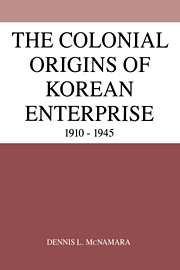3 - Colonial State
Published online by Cambridge University Press: 14 October 2009
Summary
Japanese authorities gave wide publicity to the economic and social benefits of colonial rule in their Annual Report on Reforms and Progress in Chōsen. They too promoted an image of benign capitalism, but without nationalist concerns for indigenous ownership or an autonomous national economy. Yet even the Korean businessmen who might profit from such growth found themselves scrambling to survive and succeed in a closely supervised environment dominated by Japanese investment. The prominence of military leaders selected to direct the colony and the stringency of their control were evidence of the strategic importance of the Korean peninsula: a buffer against continental aggression and a base for expansion into Manchuria and China. The state never wavered in its commitment to security and control, to economic development of the peninsula as a self-sufficient colony within the empire, and later to establish Korea as a forward base for expansion into the Japanese-controlled territory of Manchukuo. The government-general kept a tight rein on an often hostile Korean populace fiercely proud of their own cultural traditions and long accustomed to domestic self-rule as an independent nation within the Chinese orbit. They denied Koreans political participation while encouraging a closely supervised role in the economy.
The colonial state has been aptly characterized as growth-oriented and interventionist in economic affairs, promoting the peninsula as a base for mineral, agricultural, and eventually manufactured exports.
- Type
- Chapter
- Information
- The Colonial Origins of Korean Enterprise1910–1945, pp. 34 - 50Publisher: Cambridge University PressPrint publication year: 1990

